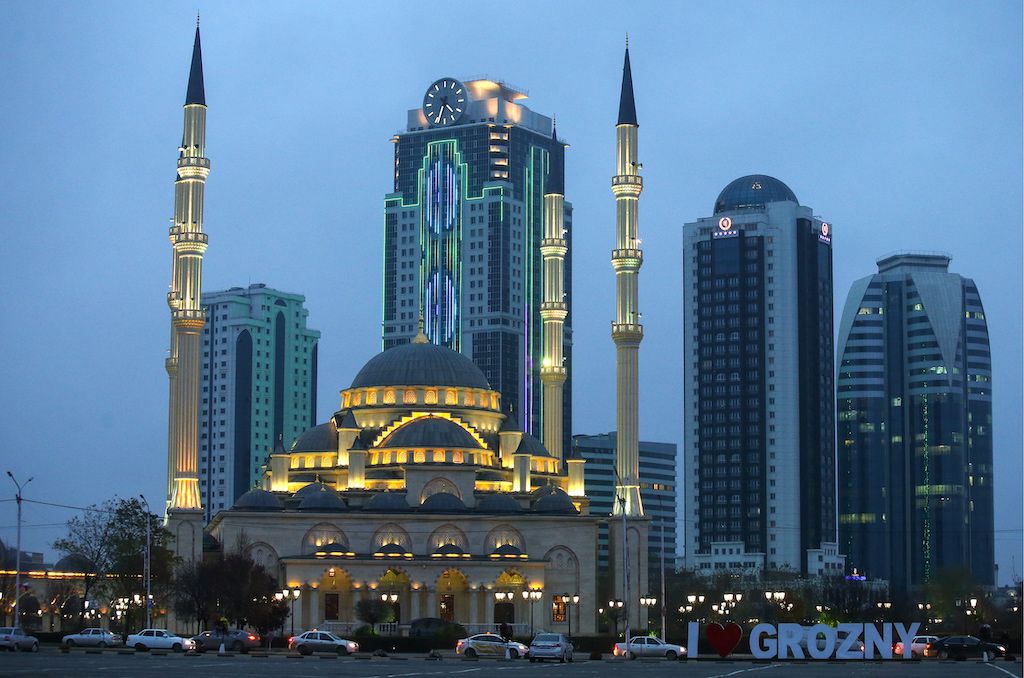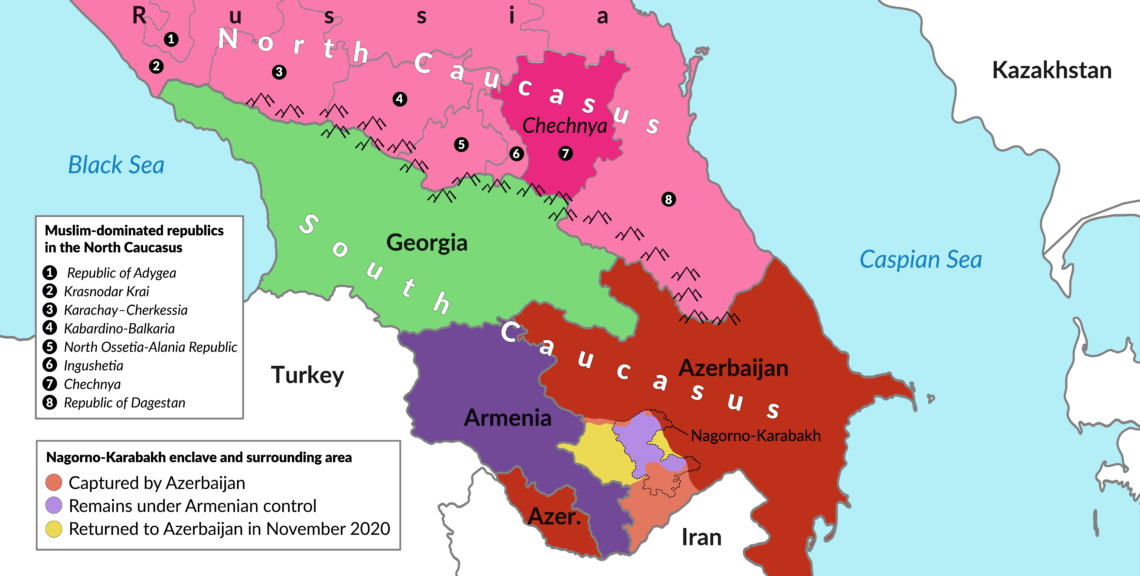The Kremlin’s Chechen factor
The latest violent chapter in the conflict over Nagorno-Karabakh has rebalanced geopolitical realities in the South Caucasus. Turkey has made significant progress in expanding its role there. If radical Islam spills over into Chechnya, Russia could face a serious security risk.

In a nutshell
- New trouble is brewing for Russia in the Caucasus
- Azerbaijan’s war on Armenia stirred radical Islam sentiments
- Turkey has reinserted itself in the South Caucasus
The recent war in and around Nagorno-Karabakh was a major regional event that ended badly not only for the Armenian side. Even if Russia may take credit for having helped broker a cease-fire, and even if it does succeed in enforcing that deal, the Kremlin has a host of reasons to be concerned about the longer-term implications.
As a result of the war, geopolitical realities in the South Caucasus have been significantly rebalanced in favor of outside players with serious stakes in what will follow. Even more disturbing for Russia is that the war has been associated with a surge in radical political Islam threatening to spill over into the highly combustive North Caucasus.
Facts & figures

Islamist threat
Russians have long and vivid memories of how the territories that make up the Russian Federation’s southern fringe, between the Caspian and the Black Seas, served as incubators for Islamist radicalism. They remember how their imperial army spent a good part of the early 19th century seeking to pacify Chechen and Dagestani insurgencies led by the legendary Imam Shamil (1834-1859). And they have painful memories of the two bloody Chechen wars fought in 1994-1996 and 1999-2009.
Russia might be looking at a third war in the North Caucasus and the conflagration might spread well outside Chechnya.
Challenges to the federal security forces ranged from the proclamation, in 1991, of the Chechen Republic of Ichkeria to a series of terrorist attacks like the Dubrovka Theater siege in Moscow in 2002 and the school shooting in Beslan some two years later. Radicals from the region are also believed to have traveled to join and fight with Islamic State.
While Chechen fighters have posed the greatest threat historically, it is presently also, paradoxically, the Chechens that constitute the linchpin of the Russian security system in the Muslim-dominated republics in the North Caucasus. If this situation were to come unglued, Russia might be looking at a third war in the North Caucasus and, this time, the conflagration might spread well outside Chechnya. It is this danger, more so than the plight of Armenia, that gives the Kremlin cause to look with rapt attention at what may follow in the region.
Turkey’s dream
The most tangible outcome of the war is that Turkish President Recep Tayyip Erdogan will have taken another significant step toward realizing his vision of Turkey’s return as a major Caucasian power. By providing robust political and military support for Baku’s largely successful offensive against Armenian forces occupying parts of Azerbaijan’s territory, Turkey has served yet another warning to its NATO allies that it would continue operating by its own playbook.
It is true that Armenia has attracted a good deal of sympathy from governments in Europe and North America. There has been a mobilization of political demands for the recognition of the self-proclaimed Armenian entity of Artsakh, otherwise known as Nagorno-Karabakh, and there have even been reports of Greeks fighting alongside the Armenians. But what the sympathy wave has brought home has been the realization that it is Turkey that calls the shots now.
Russia’s discomfort
While this situation may be politically and morally irritating to governments in the West, to the Kremlin it provides a powerful signal that its long-established role as regional hegemon is under frontal assault. Although the Kremlin has managed to put an end to the shooting war before Azerbaijan could completely defeat the Armenian forces, what is left of the self-proclaimed Artsakh is a bleak shadow of what it was in September.
Presently, as Russia deploys some 2,000 peacekeeping troops from its 15th Independent Motorized Rifle Brigade, it will need to address two interrelated challenges. One concerns its relation to Armenia, and the other, the need to prevent further expansion of Turkish influence.
A prominent Iranian mullah has proclaimed that Nagorno-Karabakh belongs to the Muslim world and must be liberated.
During the long-standing “frozen conflict” in Nagorno-Karabakh (after it declared its independence from Azerbaijan in 1991), Russia acted as protector for landlocked Armenia. It is the only country in the South Caucasus to have joined the Russia-led Collective Security Treaty Organization. The membership entails mutual security guarantees. Russia has a large military base at Gyumri and has been a major weapons provider for the Armenian military. In return, Armenia has been the only real friend Russia has been able to count on. That arrangement is now in jeopardy.
The Kremlin has made it clear that its treaty obligation to stand by Armenia does not cover the latter’s troops in and around Nagorno-Karabakh. This said, there is still a good deal of bitterness in Armenia that Russia stood idly by when the Azeri forces, backed by Turkey, pressed on with their offensive. The danger to the Kremlin is that Armenian politics may now turn more decisively towards the West for support and protection. Turkey’s refusal to acknowledge the Ottoman government’s 1915 genocide on Armenians may intensify this trend.
Radical Islam
While an enhanced Western presence in the region would be unwelcome from the Kremlin’s perspective, Moscow has far greater reason to be concerned about the expanding role of radical Islam. As Azerbaijan went on the offensive, it garnered religious support not only from Turkey but also from Pakistan and the significant Azeri population in Iran. A prominent Iranian mullah has proclaimed that Nagorno-Karabakh belongs to the Muslim world and must be liberated. The danger is that President Erdogan’s vision of pan-Turkism may lead to a groundswell of Islamist insurgencies in a region that already has a bloody track record.
During the early stages of the latest war, there were disturbing reports of Turkey facilitating the transfer of rebel fighters from Syria to support the armed forces of Azerbaijan. Although officially denied by both Ankara and Baku, these allegations were widely accepted as true and caused both Moscow and Paris to express grave concern. At about the same time, battle-hardened Chechen fighters were spotted in action, again on the side of Azerbaijan. While some of those claims were probably false, they signal the need to consider potential implications of the Chechen factor for further developments.
Moscow’s options
The Kremlin is looking at two possible scenarios. The more benign one is that of secessions, exemplified by the Chechen Republic of Ichkeria. Created in 1994, in the wake of the collapsed Soviet Union on the territory of what had been the Checheno-Ingush Autonomous Soviet Socialist Republic, Ichkeria achieved de facto independence from Russia in 1996 and functioned as a partially recognized separatist entity until it was liquidated by Russian federal forces in 2000. Many have since argued that Russia would have been better off simply allowing the troublesome peoples of the North Caucasus to be and set up their own states. But ceding territory is not in the Kremlin’s political DNA.
The key to the suppression of the Caucasus-based terror was the Kremlin’s bargain with one of the most fearsome warlords.
The other, more significant, scenario would entail moves to establish a Caucasus caliphate, along the lines of Islamic State in Iraq and Syria. A role model for such a project emerged in 2007 when Chechen warlord Doku (Dokka) Umarov was pronounced “Emir of the new Caucasus Emirate.” Dubbed “Russia’s bin Laden,” the man embarked on a program to establish an independent Islamist state and drive Russia out of the North Caucasus.
Militants inspired by his leadership were held responsible for numerous terror attacks, including the bombings of Moscow’s Domodedovo Airport, two Moscow metro stations and a Moscow to St. Petersburg train. In 2013, the warlord also sought to inspire terror attacks at the Sochi Winter Olympics. Following several erroneous reports of his killing by the Russian security forces, the Caucasus Emirate itself announced his “martyrdom” in March 2014. No cause of death was given.
Costly ally
The key to the suppression of the emirate and other Caucasus-based terror networks was the Kremlin’s bargain with one of the most fearsome warlords, leaving him to take care of repression. The man who fit the bill was Ramzan Kadyrov, who had fought against Russia in the first Chechen war. When the second offensive was launched, in 1999, he defected to the Russian side and began hunting down his former allies.
His method for restoring order was a reign of terror that made Chechnya an impossibly dangerous place for journalists and human rights advocates. In February 2007, President Putin signed a decree nominating Mr. Kadyrov president of the Republic of Chechnya. The man had served his master well and could continue doing so.
During the Russian intervention in Syria, President Kadyrov made himself extra useful by sending a contingent of Chechen military police to patrol Aleppo. As Muslims, they were well received by the locals.
The most visible price the Kremlin has been forced to pay for services rendered has been a lavish flow of federal funds into Chechnya. This bounty has, among other things, allowed a transformation of the capital city Grozny from a bombed-out heap of rubble into a modern city with a glitzy townscape featuring the splendid Akhmad Kadyrov Mosque (named after Ramzan Kadyrov’s father, the mufti of Ichkeria and first president of the Republic of Chechnya, assassinated in 2004).
Bloody trail
Less visible and palatable parts of that arrangement have entailed putting up with gross human rights abuses inside Chechnya, turning a blind eye to the proliferation of Chechen organized crime groups that have a hold also on Sochi and tolerating Chechen hitmen undertaking high profile assassinations in Moscow itself. In 2006, the investigative journalist Anna Politkovskaya was murdered at the entrance to her home and in 2015, opposition leader Boris Nemtsov was gunned down under the very walls of the Kremlin. President Putin’s image at home and abroad has been tainted by these foul deeds.
More recently, Chechens have also embarked on a campaign of assassinations of fellow countrymen in European countries. Two of the more prominent victims have been former military commander Zelimkhan Khangoshvili, who was shot dead in broad daylight in a park in central Berlin, and Chechen separatist Mamikhan Umarov, gunned down outside a shopping mall in Vienna. While Mr. Kadyrov does not seem to be overly concerned about being held responsible for ordering these killings, it is a growing problem for the Kremlin.
Scenarios
The contract between the two sides is based on strong mutual dependence. While President Putin is well aware that he cannot manage security in the North Caucasus without Mr. Kadyrov’s help, the latter is equally aware that he cannot challenge his master without running a very high risk of being overthrown by ambitious rivals.
As the situation in the South Caucasus is heating up, the insurance premium for keeping order in the North Caucasus will also go up, meaning the Kremlin will be forced to accept even more egregious forms of behavior from the Kadyrov regime.
One scenario the Kremlin likely finds most unsettling is that of Mr. Kadyrov being overthrown or expiring from natural causes. The outcome would be intense rebel infighting likely to spread to other republics. Russian federal troops might, in consequence, be forced to embark on a third Chechen war.







